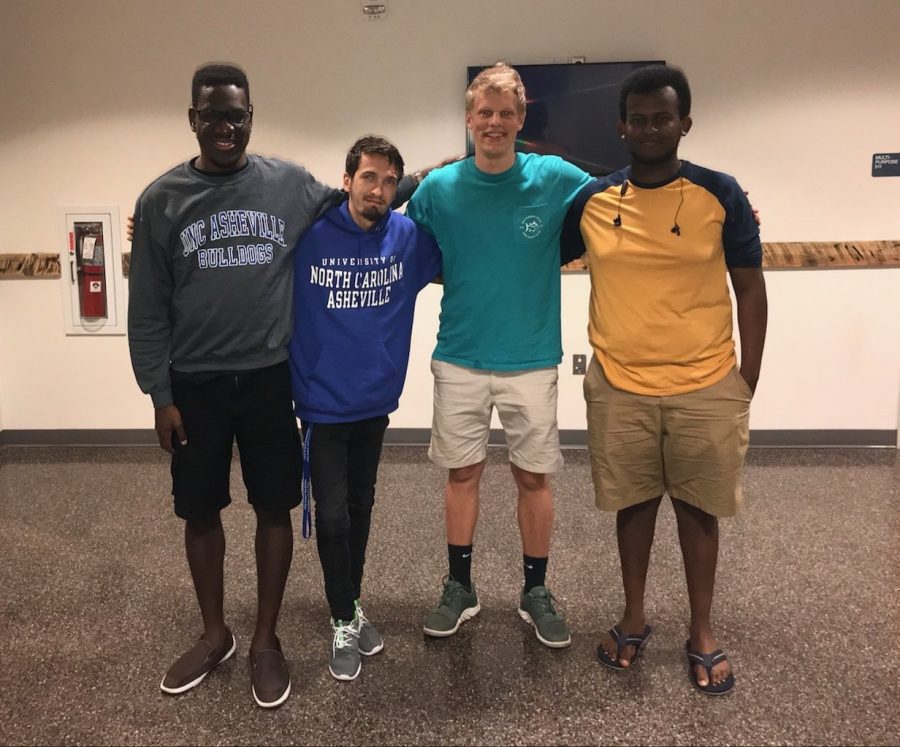‘Seahawks disguised as Bulldogs:’ UNCW students find a temporary home in Asheville
From left to right: UNC Wilmington students Lanre Badmus, Jay Parrack, Eddy Cornish and Anamo Kisho were among nearly a dozen UNCW students who took refuge at UNC Asheville during UNCW’s evacuation ahead of Hurricane Florence.
ASHEVILLE — As Hurricane Florence made its way to the North Carolina coast early last week, UNC Wilmington officials issued a mandatory evacuation for students that left many who hailed from outside the state’s borders without a place to go.
The evacuation resulted in the university busing 11 UNCW students a few hundred miles inland to be housed on UNC Asheville’s campus until the storm had passed. Many of the students, including senior Teo Buhler, a study-abroad student from France, had nowhere to go at a moment’s notice. He said he feared what may be left to return to in Wilmington.
“I feel scared about what’s going to happen, and the more I watch the news the more worried I become,” said Buhler, a dual-degree student from Kedge Business School in Marseille.
Jon Kapell, director for Campus Activities & Involvement (CAIC) at UNCW, spearheaded the evacuation process to UNCA.
“So, we did a dry run for a program called ‘Hurricane Zephyr’ last fall, and it took two years to build that program,” Kapell said. “And what that essentially was, ‘What would we do leaving UNCW if we were to get hit by a Category 4 or 5 hurricane that might cause catastrophic damage to the campus, and how would we handle a mass evacuation?’”
“Hurricane Zephyr” was executed for a 24-hour period last October at UNC Greensboro, with ten students volunteering and the American Red Cross also participating. However, the staff had anticipated a much longer period of time here in Asheville.
The original plan was to have up to a combined 100 students between two buses transferred from Wilmington to Asheville to sleep in Red Cross-provided cots in the campus gymnasium. But, based on the lower number of students who actually made the trip, Kapell and the UNCW staff were able to work with UNCA to provide residence hall accommodations with actual beds.
UNCA was also involved with that project, and David Weldon, UNCA director for Emergency Management, said that had helped them forge and establish relationships with UNCW administrators and staff.
“Having that exercise under our belt had already established some relationships and understandings about what would have to take place,” said Weldon.
While Buhler said that he needed to turn the television off to calm himself, he was confident in any necessary rebuilding efforts and said that Wilmington has become a second home to him in his two years at the university.
UNCW junior Jay Parrack, a study-abroad student from the University of Hertfordshire in the United Kingdom, shared Buhler’s sentiments.
“Wilmington is a place I’ve formed a real connection with, and as a proud UNCW Seahawk, I’m worried about what I’m going to return to, as well as worried for those who are unable to evacuate,” Parrack said.
Parrack had only been at UNCW for just under a month prior to the evacuation but said he has quickly grown to love the campus and considers himself fortunate enough to be able to call Wilmington his home for his year-long study abroad program.
Despite the heartbreak of being displaced from campus, the Seahawk contingent in Asheville has found a silver lining while enjoying its time at UNCA.
“You could tell that UNCA put a lot of care into it,” said Parrack. “Every single department, whether it’s housing, dining or even the rec center has really helped us feel like UNCA students – Seahawks disguised as Bulldogs.”
UNCA international students Nicole Chiavarini and Janet Lestelin, both on a year-long study abroad program from the U.k., helped welcome the UNCW evacuees to campus and have enjoyed getting to know them thus far.
“You’ve all been a great bunch, and I think we’ve all got on,” said Chiavarini. “We’ve enjoyed having your company on campus.”
Could this be a precursor to additional closer relationships between the two campuses on opposite ends of North Carolina – perhaps with more student visits to either campus? According to Weldon, it is very much a possibility.
“I think it would be a great opportunity, not only for the students but for the universities to learn,” said Weldon. “I think the more collaboration we can have, the better it can be.”








